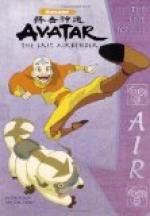Bruce gave one startled look behind them, then began working feverishly. Already Barney and the Major were unstrapping themselves.
Across the ice in the vague moonlight a motley throng, a hundred strong, was charging down upon them. Half-naked, their brown arms gleaming, they seemed the inhabitants of some South Sea isle rather than Eskimos of the Farthest North. Copper-pointed spears gleamed yellow and gold, while here and there the dark barrel of a hunting rifle was to be seen.
“Go slow,” warned the Major. “Remember it’s men, women and children instead of wolves this time. They’re wild, but they’re human. Send a volley into the ice-piles at the left. Show ’em what you’ve got and they’ll stop—perhaps.”
As Bruce turned the barrel of his deadly weapon, he caught the low rumble of many voices. The natives were chanting a witching song to destroy the power of evil spirits.
“Tat-tat-tat-tat.” The machine-gun spoke. Bits of ice flew wildly. The mob halted for a moment, then plunged on, still chanting that maddening song.
Just at the moment when a massacre seemed inevitable, there came a roar from the right. Turning, Bruce saw the form of a bearded man apparently rising from a hole in a giant ice-cake. At the sound the wild mob halted.
“Hey! You fellows!” the stranger bellowed. “What’s the matter with you?” Then he turned to the natives and began to harangue them in a tongue quite unknown even to the Major.
The instant Bruce saw the red-whiskered giant rise, seemingly from the ocean, his hand relaxed on the machine-gun and he stood in ready expectation. The Eskimos appeared to understand the words which the stranger flung at them, for, though they continued their weird incantation, they lowered their weapons and did not attempt to approach nearer the white men.
Presently their weapons began clattering to the ice. Taking this as a sign of friendliness, the explorers stepped out to meet them. Seeing this, the natives gathered into a compact group, their song rising to a wild humming howl, but they made no move to attack. When the strangers were quite close, one native, braver than his companions, stepped forward. Still chanting, he handed each explorer a small cube of whale blubber. One cube remained in his own hand. This he proceeded to swallow, indicating at the same time that the strangers were to follow his example.
The moment the cubes disappeared the wild chorus ceased and the natives crowded forward to extend a hearty welcome.
It was, however, a very long time before one of them was persuaded to come near the airplane.
“I haven’t a doubt,” said the Major, “that they still believe that we rode here on the back of old Thunder-bird himself. And why not? If we can build schooners many times as large as their largest skin-boats and run them by noise alone, if we can kill at a distance by a magic of great noises, why couldn’t we tame the Thunder-bird himself and make him carry us? It is my firm conviction that if one of us were to return here in a year or two, he would hear the most outlandish tales of the Kabluna who rode the Thunder-bird.”




